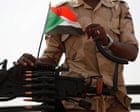
In an interconnected world, the threads of diplomacy and conflict weave a complex tapestry, unfolding across continents with far-reaching implications. As recent events reveal, the calm pursuit of resolution and humanitarian efforts remains paramount in the face of adversity.
The tragic events in Sudan highlight the dire humanitarian challenges resulting from ongoing conflict. The World Health Organization has expressed profound concern following an attack on al-Mujlad hospital in West Kordofan. This incident has claimed the lives of over 40 individuals, including six children and five health workers, alongside numerous injuries. This unfortunate attack underscores the larger backdrop of Sudan’s civil war, which has positioned the nation at the center of a humanitarian crisis of global proportions. Efforts to provide relief and restore peace continue to be crucial as organizations and nations rally to support the affected communities.
In Europe, a new chapter of support for Ukraine unfolds as the United Kingdom makes a decisive move to aid the beleaguered nation in its defense efforts. Under the leadership of Prime Minister Keir Starmer, the UK has pledged to provide 350 advanced air defense missiles to Ukraine. Notably, this aid package will be funded using £70m derived from interest on frozen Russian assets, marking the first usage of such funds to procure military equipment for Kyiv. This strategic support reflects an innovative approach to sustaining Ukraine’s sovereignty and resilience in the face of ongoing challenges.
Meanwhile, on the world stage, the precarious balance between diplomacy and conflict takes center stage at the NATO summit in the Netherlands. Here, leaders gather to address the fragile situation between Israel and Iran, a relationship shaped by delicate ceasefires and strategic negotiations. Amidst the discussions, US President Donald Trump alluded to historical lessons, drawing parallels with pivotal moments from the past, including the atomic bombing of Hiroshima. At the summit, leaders, including Prime Minister Starmer, stress the importance of maintaining ceasefires, thereby allowing negotiations to take place that could lead to sustained peace and security in the region.
In the Middle East, recent developments underline the continuous cycle of conflict and efforts toward stability. Reports from Gaza reveal that at least twenty individuals have lost their lives due to Israeli military actions. Casualties include those who were caught in the crossfire while awaiting humanitarian aid. Such incidents amplify calls for diplomatic intervention and humanitarian assistance to address the profound needs of civilians and curb further escalations in violence.
As these narratives from different corners of the globe unfold, one constant remains—the ceaseless commitment to finding conciliatory paths in the face of adversity. While challenges persist, there is also hope embodied in the collective efforts of nations, organizations, and individuals striving for peace. These endeavors remind us of the resilience of the human spirit and the potential for diplomacy to prevail, even amidst the most daunting of challenges.
Source: {link}
